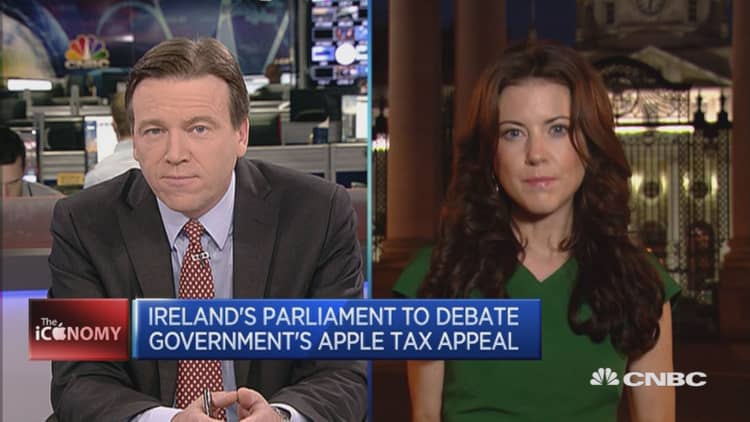
Ireland's government has admitted that it will have to accept a 13 billion euros ($14.6 billion) payment from Apple ordered by the European Commission, despite well-publicized resistance to the award from its politicians.
The country's Department of Finance said in a briefing paper sent to members of the Dail, Ireland's parliament, that its Revenue Commission would have to collect the sum and put it into an escrow account, ahead of a key debate on Wednesday on whether or not to appeal the decision.
The special sitting of the Dail comes after considerable protests by both Apple and the Irish authorities over the EC decision, which was made on the basis that low tax rates for Apple subsidiaries based in Ireland constituted illegal state aid. This has been hotly contested by the U.S. technology giant, which has had operations in Ireland for more than three decades.
The Department of Finance is insistent that the actions which led to Apple paying an effective corporate tax rate of 1 percent on its European profits in 2003, which fell to 0.005 percent in 2014, were legal under Irish tax law.
"The European Commission doesn't have responsibility for taxation matters," John Paul Phelan, chair of the Dail's Budget Committee, told CNBC Wednesday.
Tim Cook, Apple chief executive, has dismissed the ruling as "political crap", but recently said that Apple is planning to repatriate some of its $215 billion overseas cash back to the U.S. next year.
Ireland, where corporation tax is 12.5 percent, has built a reputation as a tax haven over many years, but this has become particularly controversial in the post-credit crisis world, after its bailout by the European Union, and amid growing international scrutiny of multinational companies' tax affairs.
"The government has always had a head-in-the-sand approach when it came to Apple," Pearse Doherty, finance spokesperson for opposition party Sinn Féin, told CNBC Wednesday.
Many Irish residents want to keep its low-tax status to attract investments, according to a poll released Monday for RTE, Ireland's national broadcaster, which showed that 62 percent of respondents supported the Irish government appealing the decision.
"Ultimately Irish people realise how important multinational investment and jobs are to this economy. Between one in six jobs is dependent on a multinational employer. It is core to our economic model and it is important the government defends this economic model," Fergal O'Brien, chief economist at IBEC, told CNBC Wednesday.


